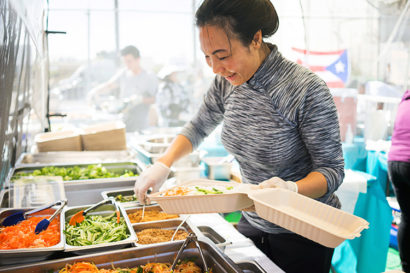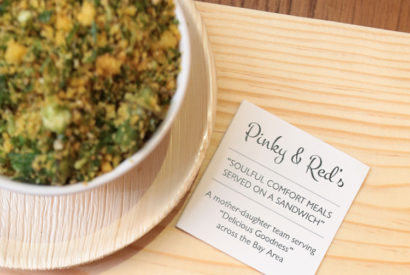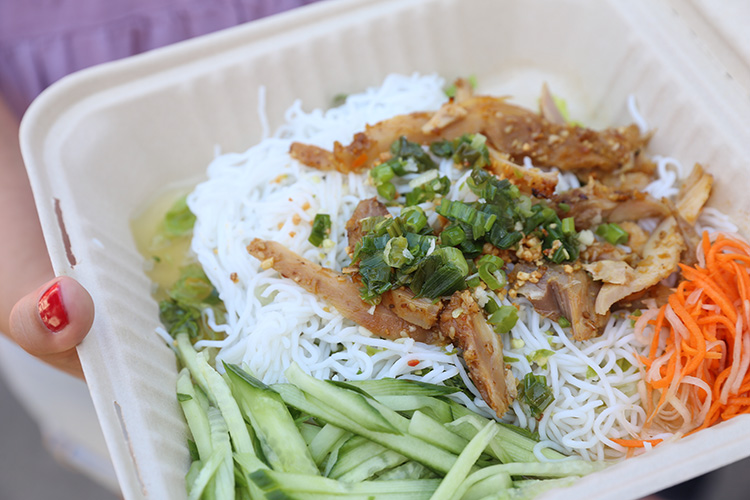New cafes, coffee spot, tavern sprout on campus
Highlights include five new businesses from La Cocina's, a food incubator that supports women and immigrants
August 17, 2018

Sicily Johnson (left) and Bernadine Sewell (right), are the mother-daughter duo behind Pinky and Red’s, one of the new cafes coming to campus this fall. (Photo courtesy of La Cocina)
Hungry for a dash of social mobility with your lunch? Five new cafes — all the spawn of the La Cocina food incubator — will be serving that up in UC Berkeley’s student union this fall.
Think Chilean empanadas, soul food, traditional Syrian dishes, cookies and cakes and Vietnamese noodle soups, cooked up by entrepreneurs supported by La Cocina’s social mobility mission: mostly women, especially women of color, parents and immigrants.
La Cocina, which was launched in 2005 in San Francisco’s Mission District, was born out of a belief that people, given the right resources, can create self-sufficient businesses that benefit themselves, their families and their community. The nonprofit provides aspiring food providers with affordable commercial kitchen space, industry-specific technical assistance and access to market opportunities.
Each of the five cafes coming to Berkeley is an outpost of a business that started under La Cocina’s wing. Each has its own flavors — and story:

Hang Truong of Noodle Girl, one of the five La Cocina-backed restaurants now available on campus (Photo courtesy of La Cocina)
Noodle Girl – Hang Truong’s deep connection with the noodles and soups of her native Vietnam ties back to her childhood. When she was 10, Truong worked beside her mother in a noodle shop, painstakingly learning the art of creating the tasty noodle dishes she now serves at Noodle Girl.
For Truong, cooking remains deeply woven into her life, through marriage and immigration from Vietnam to the U.S. Over time, her exploration of cooking has changed. While nurturing her husband through a serious illness, Truong explored healthy cooking like never before, combining the dishes she had learned early in her life with more vegetables and other nutritious ingredients.
Old Damascus Fare – Before the war, Rawaa Kasedah, her husband, Aref Rawas, and their four children lived a prosperous life in Syria. Rawas’ two clothing companies provided the family with plenty, and Kasedah did not work. By 2012, however, the situation within the country had deteriorated and the family uprooted itself, first to Jordan for three years and eventually to Oakland — with only a few suitcases containing their old life.
While they left behind much in Syria – a house, a business, their extended family – they carried with them the recipes of the food from back home. Kasedah began cooking for friends she made in their new home. She began catering birthday parties and other celebrations, generating a buzz about her food. Encouraged by the community, Kasedah and Rawas named their catering company Old Damascus Fare, and, with the backing of La Cocina, their catering business has been serving up Syrian favorites on a larger scale ever since.
A Girl Named Pinky – Disappointed by each of the wedding cakes she sampled when planning her wedding, Tina Stevens realized that she could do better. Stevens, who had been baking in her home in Berkeley for the last 20 years, made her own cake, and served a three-tiered chocolate, carrot and vanilla bean cake with lemon curd to her wedding guests. Her family and friends have been hounding her to bake cakes for them ever since.
A Girl Named Pinky, a custom bakery, is the result of Stevens’ efforts. Since last year, A Girl Named Pinky has served cupcakes, cake pops, brownies and cookies through La Cocina, and Stevens held her first pop-up in Oakland last winter. She says she’s “in the happy business,” and her custom birthday, wedding and large celebration cakes are at the heart of all that joy.

Pinky and Red’s serves comfort meals on a sandwich. (Photo courtesy of La Cocina)
Pinky and Red’s — Serving up killer comfort dishes that have been passed down through six generations of family Sunday dinners, Pinky and Red’s is a mother-daughter restaurant that serves soul food on a sandwich. Owned and operated by Sicily Johnson and Bernadine Sewell in San Francisco, Pinky and Red’s has been catering meals based on recipes that were feeding people over 100 years ago. This is their first cafe.
“The small things are very important to us,” writes Sewell. “We want our customers to know that we will be leaders as entrepreneurs, provide excellent customer service, serve authentic food with the flavor and taste that are true to our recipes entrusted to us by our ancestors.”
El Mesón de Violeta – Carmen Figueroa has been working in food in the United States and in her native Chile for years, and the empanadas she serves at El Mesón de Violeta come from a tradition that has nourished her family for generations. According to Figueroa, what we choose to eat is the ultimate act of social and ecological justice, and that is why she uses ingredients springing from local farmers and traditional agriculture based on sustainable practices.
“To talk about empanadas is to talk about family gatherings at grandma’s house,” writes Figueroa. “It’s about taste, color, aromas, texture of ingredients that would be later become memorable dishes stuck in our retina and souls forever.”

The dishes served at Noodle Girl reflect the traditions that Hang Truong learned at her mother’s side in Vietnam. (Photo courtesy of La Cocina)
All five are staging soft openings this week, and plan to be fully open on Monday.
In addition to the La Cocina five, Berkeley’s student union is also becoming the home to the second branch of 1951 Coffee, whose employees are all refugees, have been granted asylum or have special immigration visas.
It started at 2410 Channing Way between Telegraph and Dana. The new location will employ a manager, 10 full-time baristas, and two part-time baristas — all from Afghanistan, Bhutan, Ethiopia, Eritrea and Uganda.
“UC Berkeley has been incredibly supportive of our mission since our first cafe opened in January 2017,” says Doug Hewitt and Rachel Taber, the co-founders of 1951 Coffee. “We are thrilled to expand our presence on campus, which gives us the opportunity to employ even more graduates of our Oakland-based barista training program, as well as to expand our reach in educating our neighbors about refugee life and issues.”
And opening next month in Lower Sproul Plaza will be the Bear’s Lair Tavern, a bar and grill that is a nod to the original Bear’s Lair, a hangout for students and others in the community from 1962 to 2012. The tavern’s gastropub fare is sourced largely from local farms or farmer’s markets and will also feature 20 rotating beers, cider and kombucha on tap, cocktails and wine. A portion of the restaurant’s sales will go to support UC Berkeley student organizations and programs.